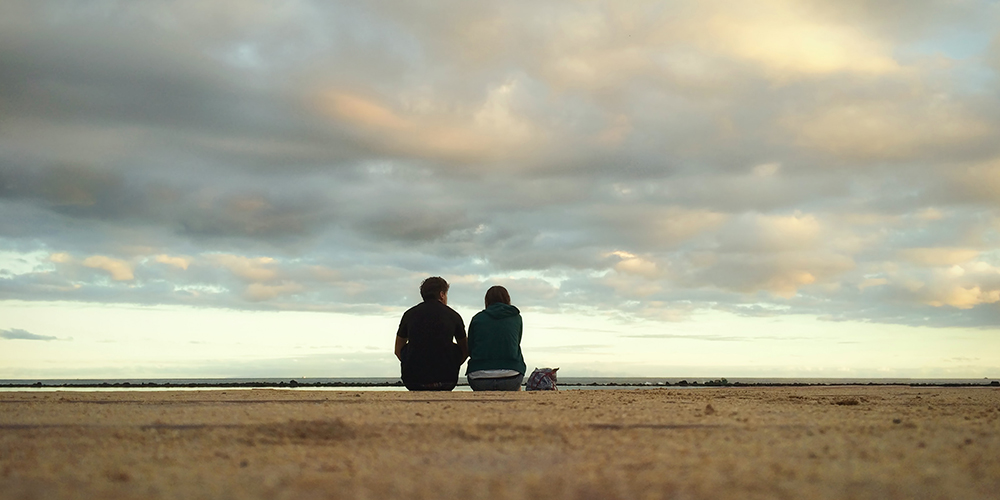Can you lead a happy life with cancer?
Text: Jan Müller
A serious illness changes the way a person looks at their life, how they can and want to shape its course. Philosopher Jan Müller ponders how this new reality influences various areas of life.
When you’re diagnosed with a life-threatening illness, you’re confronted with the question of how to live a good life with your illness, not despite it. This becomes more urgent as the illness takes up more and more space and makes happiness so much harder in many different respects.
Alienated from your own body
Practically every person with a serious illness suffers pain at some point. All of a sudden, your own body becomes your sole focus: What’s happening to me? While many forms of pain can be alleviated, they unsettle the tacit assumption we all make that we are “at home” in our bodies and can rely on our own innate strength. As the illness progresses, you are forced to continuously adjust old, familiar self-images that you may have only just, and with some effort, reclaimed.
You quickly learn to recognize the “physician’s gaze”, that benevolent yet objectifying perspective. While it helps to reframe the subjective experience, to explain it and make it more tolerable, there’s also a risk of viewing yourself too much from this external perspective and thereby becoming alienated from yourself.
Striving for self-determination
Living a meaningful life includes living as autonomously as possible and being able to deal with the things that life throws at you. Many patients describe the enormous changes that take place after diagnosis as a loss of autonomy: From within, as their own experiences become invisible, and from without, when the complex interdisciplinary cogs of the cancer treatment machine start turning, requiring them to surrender themselves to its processes and procedures. If the cancer has reached an incurable stage, a patient’s freedom becomes more restricted over time.
Nevertheless, patients report that the distinction between curative (healing) and palliative (alleviating) treatments sounds very different to their ears: Where people not affected by cancer quickly jump to the conclusion that “the battle is already lost,” patients focus on living everyday life to the full, firmly hoping to continue as well and for as long as possible, even if their freedoms start to shrink. Some patients can even find it truly liberating when they make the decision to forego further treatment.
From the outset, however, the patient and their medical specialists must constantly tread a fine line, weighing up “quality of life” against the therapeutic benefits of treatments. Continuously adjusting to your own situation, so to speak, is an ongoing challenge. Things that should be natural become precious: Contact and relationships with loved ones; maintaining a satisfying and fulfilling career for as long as possible; intellectual challenges, spiritual and natural experiences; a home that provides protection.
Time is no longer your own
What will happen to my plans, hopes and expectations when my life span suddenly becomes a “scarce resource”? In the beginning, upon diagnosis, crisis is inevitable. If you manage to find your way back into everyday life, the disease and its treatment will play a decisive role in the rhythm of your days and weeks. One patient described their illness as “the heartbeat of my days”: Doctor’s visits, medications at specific times, cyclical side effects... Patients constantly ask themselves how long their energy will last on any given day. They plan their work and leisure time differently because fatigue and nausea, for example, are ever-present possibilities. One friend says: “I’d love to make plans with you, but only with caveats.” Such uncertainty takes courage.
“Illness is never entirely solitary”
All of these aspects affect relationships with others. The closer a social relationship, the more likely it is that the other person will at best be less affected, rather than unaffected, and much depends on how people deal with this knowledge.
Other people’s perspective and attitude have a major impact on how easy or difficult patients find it to share and shape their situation. “I have to remind myself that I’m more than just my illness,” a friend told me. “Sometimes I have to moderate and navigate both my own fear and the fear of other people, so that I don’t disappear behind the image they’re creating of me.”
This also affects whether it is possible to mourn the life you’ll no longer be able to have, all your hopes and dreams. This is radically different for patients compared with those less affected. But perhaps together, you can mourn the fact that each person has something different to mourn and find solace in this vivid connection created in the moment.
Jan Müller has been an associate at Basel University's Department of Practical Philosophy since 2016 where his research focuses on the ethics of interpersonal relations. His contact with cancer has been as one of the "less affected".
More articles in this issue of UNI NOVA (May 2023).

